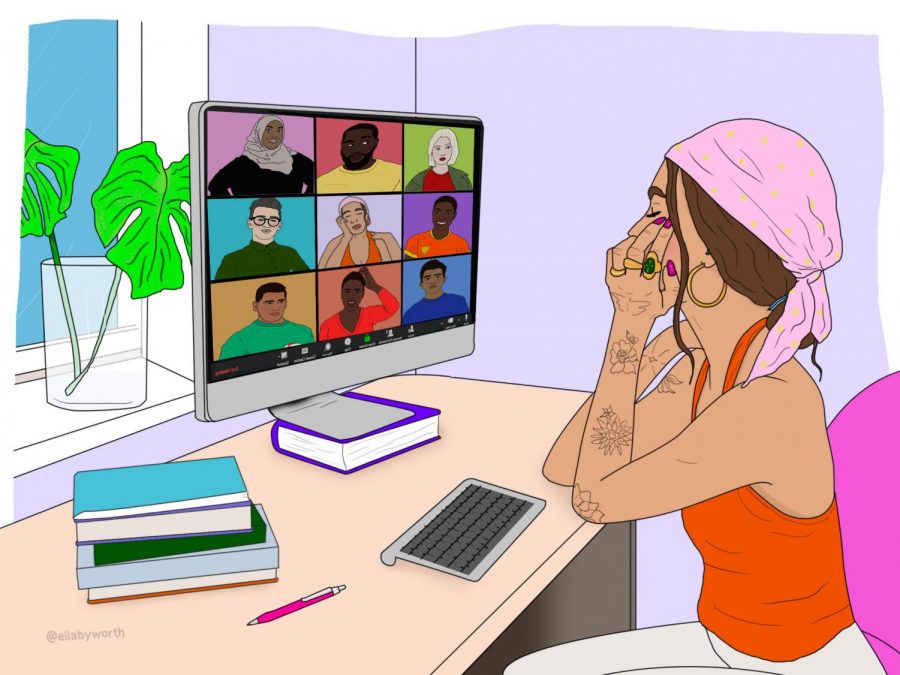“Zoom Dysmorphia”
January 29, 2021
Being on Google Meet, Zoom, or video-chat with friends/family for the past 10 months has taken a toll on all of us whether that be bad posture, worsening eye sight, or the complete lack of human interaction and touch. However, being on these calls 24/7 also has a surprising, yet profound effect on how we view ourselves.
If you ever caught yourself staring at your own live video and found that features of your face seem to have changed or are “uglier”, you are most likely are feeling the effects of “Zoom Dysmorphia.”
Staring at your own reflection in these video calls can change the way you perceive yourself, as computer cameras capture a low quality 2D version of yourself; it can showcase disfigured images that are not completely accurate to how you look in reality. Therefore, it induces the effect of “Zoom Dysmorphia” when you can start to nitpick and criticize each and every flaw that you never paid attention to before the pandemic.
The effects can be seen in the rise of the demand for plastic surgery. People have sought out surgery in order to fix imperfections in order to look more pleasing on camera. According to the new study done by the International Journal of Women’s Dermatology, “50% of doctors surveyed indicated a relative rise in cosmetic consultations despite the pandemic. Also, about 86% of respondents report their patients are referencing video-conferencing as a reason for their new cosmetic concerns.” The isolation of the pandemic only heightens the need to perfect appearances as people can be home alone for hours where they can be near a bathroom mirror, be on work calls, and go on social media for long amounts of time. Society already places a big emphasis on being flawless and these Zoom calls only heighten people’s self esteem issues.
Dr. Kourosh, one of the leaders of this study, noted that “[i]t was important to raise awareness about this. Because as a physician, especially aesthetic physicians, we have the tools to alter and improve a person’s appearance. But those need to be used wisely and in the correct circumstance.”
One way to cope with this issue would be to cover the live video feed of yourself and not the actual camera. This is to ensure that you can still be on call, but also not have to worry about looking at yourself. Other methods are to say positive affirmations in the mirror everyday, refrain from using social media, and identify negative thoughts and address them in a positive light.
Furthermore, it is also important to mention that “Zoom Dysmorphia” can be misleading and can minimize the severity of the mental disorder called Body Dysmorphia Disorder (BDD). According to the Anxiety and Depression Association of America, “BDD is a body-image disorder characterized by persistent and intrusive preoccupations with an imagined or slight defect in one’s appearance.” The effects of BDD are much more serious and can affect a person’s life significantly. For example, those who have BDD “think about their real or perceived flaws for hours each day. They can’t control their negative thoughts and don’t believe people who tell them that they look fine. Their thoughts may cause severe emotional distress and interfere with their daily functioning.”
So although people with “Zoom Dysmorphia” have similar symptoms to those with BDD, BDD is much more severe. Dr. Koush explains “In writing about the phenomenon, where people may have a different perception of their appearance. We are not seeking to diagnose with body dysmorphic disorder. I would turn to my colleagues in psychology to make a formal diagnosis of body dysmorphic disorder.”
However, fixating on your image because of video conference calls can lead to BDD, so if you feel any symptoms listed by the Anxiety and Depression Association of America, please reach out for help.
Wayne Hills junior Janelle Licerio commented on this issue, “I never thought this to be a problem, but I can understand how Zoom Dysmorphia can be a rising issue. I feel that with an increasing number of people participating in zoom class as well as society’s expectations of how a person should look, Zoom Dysmorphia can potentially be considered a stepping stone for BDD. Especially during this day and age, where it’s possible to fix certain features of oneself, it makes sense that there is a significant increase in request for plastic surgeries.”







